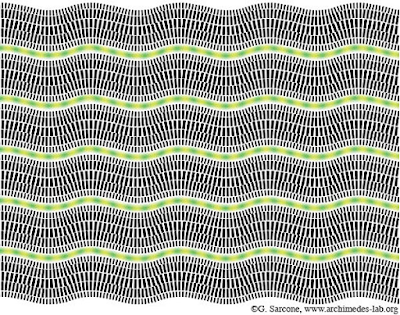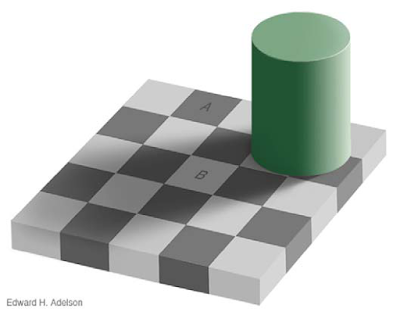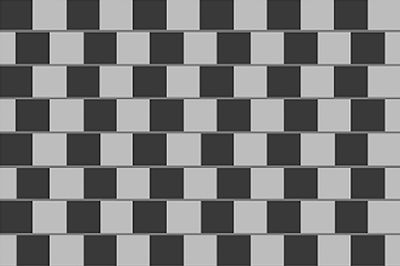I developed the governing impression that our minds are wonderful explanation machines, capable of making sense out of almost anything, capable of mounting explanations for all manner of phenomena, and generally incapable of accepting the idea of unpredictability. These events were unexplainable, but intelligent people thought they were capable of providing convincing explanations for them—after the fact. Furthermore, the more intelligent the person, the better sounding the explanation. What's more worrisome is that all these beliefs and accounts appeared to be logically coherent and devoid of inconsistencies.
Saturday, November 29, 2008
Friday, November 28, 2008
Christmas Lights
The Christmas Lights illusion, by visual illusion artist Gianni A. Sarcone, is also based on Leviant's Enigma. Notice the appearance of a flowing motion along the green-yellow stripes.
Thursday, November 27, 2008
Brightness and Color Illusion
In this illusion, created by Edward Adelson at MIT, squares A and B are the same shade of gray. (If you don't believe it, print it out and then cut out the two squares and place them side by side.) This illusion occurs because our brain does not directly perceive the true colors and brightness of objects in the world, but instead compares the color and brightness of a given item with others in its vicinity. For instance, the same gray square will look lighter when surrounded by black than when it is surrounded by white. Another example: when you read printed text on a page under indoor lighting, the amount of light reflected by the white space on the page is lower than the amount of light that would be reflected by the black letters in direct sunlight. Your brain doesn't really care about actual light levels, though, and instead interprets the letters as black because they remain darker than the rest of the page, no matter the lighting conditions. In other words, every newspaper is also a visual illusion!
Illusory Motion
Some stationary patterns generate the illusory perception of motion. The illusory effect is usually stronger if you move your eyes around the figure. For instance, in this illusion, invented by the scientist Akiyoshi Kitaoka, the "snakes" appear to rotate. But nothing is really moving, other than your eyes! If you hold your gaze steady on one of the black dots on the center of each "snake," the motion will slow down or even stop. Because holding the eyes still stops the illusory motion, we speculate that eye movements are required to see it. Vision scientists have shown that illusory motion activates brain areas that are similar to those activated by real motion.
Shape Distortion Illusion
This illusion is known as the Café Wall illusion, and it was first discovered by Richard Gregory's laboratory in a café in Bristol, in the U.K. The black and white tiles are perfectly straight, but look tilted. It is a shape distortion illusion: an object will appear to take on shapes that are different from its actual shape. Like brightness and color illusions, shape distortion effects are also produced by the interaction between the actual shape of the object and the shapes of nearby figures. For the brain, perception is very often dependent on context.
Wednesday, November 26, 2008
dBlackSwan-8
The human mind suffers from three ailments as it comes into contact with history, what I call the triplet of opacity. They are:
a. the illusion of understanding, or how everyone thinks he knows what is going on in a world that is more complicated (or random) than they realize;
b. the retrospective distortion, or how we can assess matters only after the fact, as if they were in a rearview mirror (history seems clearer and more organized in history books than in empirical reality); and
c. the overvaluation of factual information and the handicap of authoritative and learned people, particularly when they create categories—when they "Platonify."
a. the illusion of understanding, or how everyone thinks he knows what is going on in a world that is more complicated (or random) than they realize;
b. the retrospective distortion, or how we can assess matters only after the fact, as if they were in a rearview mirror (history seems clearer and more organized in history books than in empirical reality); and
c. the overvaluation of factual information and the handicap of authoritative and learned people, particularly when they create categories—when they "Platonify."
dBlackSwan-6
Two thousand years earlier, by the same instinct of linguistic distinction, the snobbish Levantine patricians wrote in Greek, not the vernacular Aramaic. (The New Testament was written in the bad local patrician Greek of our capital, Antioch, prompting Nietzsche to shout that "God spoke bad Greek.") And, after Hellenism declined, they took up Arabic.
dBlackSwan-xxvii
THE BOTTOM LINE
The beast in this book is not just the bell curve and the self-deceiving statistician, nor the Platonified scholar who needs theories to fool himself with. It is the drive to "focus" on what makes sense to us. Living on our planet, today, requires a lot more imagination than we are made to have. We lack imagination and repress it in others.
Note that I am not relying in this book on the beastly method of collecting selective "corroborating evidence." For reasons I explain in Chapter 5, I call this overload of examples naïve empiricism—successions of anecdotes selected to fit a story do not constitute evidence. Anyone looking for confirmation will find enough of it to deceive himself—and no doubt his peers.* The Black Swan idea is based on the structure of randomness in empirical reality.
To summarize: in this (personal) essay, I stick my neck out and make a claim, against many of our habits of thought, that our world is dominated by the extreme, the unknown, and the very improbable (improbable according our current knowledge)—and all the while we spend our time engaged in small talk, focusing on the known, and the repeated. This implies the need to use the extreme event as a starting point and not treat it as an exception to be pushed under the rug. I also make the bolder (and more annoying) claim that in spite of our progress and the growth in knowledge, or perhaps because of such progress and growth, the future will be increasingly less predictable, while both human nature and social "science" seem to conspire to hide the idea from us.
*It is also naïve empiricism to provide, in support of some argument, series of eloquent confirmatory quotes by dead authorities. By searching, you can always find someone who made a well-sounding statement that confirms your point of view—and, on every topic, it is possible to find another dead thinker who said the exact opposite. Almost all of my non-Yogi Berra quotes are from people I disagree with.
The beast in this book is not just the bell curve and the self-deceiving statistician, nor the Platonified scholar who needs theories to fool himself with. It is the drive to "focus" on what makes sense to us. Living on our planet, today, requires a lot more imagination than we are made to have. We lack imagination and repress it in others.
Note that I am not relying in this book on the beastly method of collecting selective "corroborating evidence." For reasons I explain in Chapter 5, I call this overload of examples naïve empiricism—successions of anecdotes selected to fit a story do not constitute evidence. Anyone looking for confirmation will find enough of it to deceive himself—and no doubt his peers.* The Black Swan idea is based on the structure of randomness in empirical reality.
To summarize: in this (personal) essay, I stick my neck out and make a claim, against many of our habits of thought, that our world is dominated by the extreme, the unknown, and the very improbable (improbable according our current knowledge)—and all the while we spend our time engaged in small talk, focusing on the known, and the repeated. This implies the need to use the extreme event as a starting point and not treat it as an exception to be pushed under the rug. I also make the bolder (and more annoying) claim that in spite of our progress and the growth in knowledge, or perhaps because of such progress and growth, the future will be increasingly less predictable, while both human nature and social "science" seem to conspire to hide the idea from us.
*It is also naïve empiricism to provide, in support of some argument, series of eloquent confirmatory quotes by dead authorities. By searching, you can always find someone who made a well-sounding statement that confirms your point of view—and, on every topic, it is possible to find another dead thinker who said the exact opposite. Almost all of my non-Yogi Berra quotes are from people I disagree with.
dBlackSwan-xxv
what many people commoditize and label as "unknown," "improbable,"or "uncertain" is not the same thing to me; it is not a concrete and precise category of knowledge, a nerdified field, but its opposite; it is the lack (and limitations) of knowledge. It is the exact contrary of knowledge; one should learn to avoid using terms made for knowledge to describe its opposite.
What I call Platonicity, after the ideas (and personality) of the philosopher Plato, is our tendency to mistake the map for the territory, to focus on pure and well-defined "forms," whether objects, like triangles, or social notions, like Utopias (societies built according to some blueprint of what "makes sense"), even nationalities. When these ideas and crisp constructs inhabit our minds, we privilege them over other less elegant objects, those with messier and less tractable structures (an idea that I will elaborate progressively throughout this book).
Platonicity is what makes us think that we understand more than we actually do. But this does not happen everywhere. I am not saying that Platonic forms don't exist. Models and constructions, these intellectual maps of reality, are not always wrong; they are wrong only in some specific applications. The difficulty is that a) you do not know beforehand (only after the fact) where the map will be wrong, and b) the mistakes can lead to severe consequences. These models are like potentially helpful medicines that carry random but very severe side effects.
The Platonic fold is the explosive boundary where the Platonic mindset enters in contact with messy reality, where the gap between what you know and what you think you know becomes dangerously wide. It is here that the Black Swan is produced.
What I call Platonicity, after the ideas (and personality) of the philosopher Plato, is our tendency to mistake the map for the territory, to focus on pure and well-defined "forms," whether objects, like triangles, or social notions, like Utopias (societies built according to some blueprint of what "makes sense"), even nationalities. When these ideas and crisp constructs inhabit our minds, we privilege them over other less elegant objects, those with messier and less tractable structures (an idea that I will elaborate progressively throughout this book).
Platonicity is what makes us think that we understand more than we actually do. But this does not happen everywhere. I am not saying that Platonic forms don't exist. Models and constructions, these intellectual maps of reality, are not always wrong; they are wrong only in some specific applications. The difficulty is that a) you do not know beforehand (only after the fact) where the map will be wrong, and b) the mistakes can lead to severe consequences. These models are like potentially helpful medicines that carry random but very severe side effects.
The Platonic fold is the explosive boundary where the Platonic mindset enters in contact with messy reality, where the gap between what you know and what you think you know becomes dangerously wide. It is here that the Black Swan is produced.
dBlackSwan-xxiv
...We humans are not just a superficial race (this may be curable to some extent); we are a very unfair one.
...I don't particularly care about the usual. If you want to get an idea of a friend's temperament, ethics, and personal elegance, you need to look at him under the tests of severe circumstances, not under the regular rosy glow of daily life. Can you assess the danger a criminal poses by examining only what he does on an ordinary day? Can we understand health without considering wild diseases and epidemics? Indeed the normal is often irrelevant.
Almost everything in social life is produced by rare but consequential shocks and jumps; all the while almost everything studied about social life focuses on the "normal," particularly with "bell curve" methods of inference that tell you close to nothing. Why? Because the bell curve ignores large deviations, cannot handle them, yet makes us confident that we have tamed uncertainty. Its nickname in this book is GIF, Great Intellectual Fraud.
...I don't particularly care about the usual. If you want to get an idea of a friend's temperament, ethics, and personal elegance, you need to look at him under the tests of severe circumstances, not under the regular rosy glow of daily life. Can you assess the danger a criminal poses by examining only what he does on an ordinary day? Can we understand health without considering wild diseases and epidemics? Indeed the normal is often irrelevant.
Almost everything in social life is produced by rare but consequential shocks and jumps; all the while almost everything studied about social life focuses on the "normal," particularly with "bell curve" methods of inference that tell you close to nothing. Why? Because the bell curve ignores large deviations, cannot handle them, yet makes us confident that we have tamed uncertainty. Its nickname in this book is GIF, Great Intellectual Fraud.
Monday, November 24, 2008
dBlackSwan-xxii
We do not spontaneously learn that we don't learn that we don't learn. The problem lies in the structure of our minds: we don't learn rules, just facts, and only facts. Metarules (such as the rule that we have a tendency to not learn rules) we don't seem to be good at getting. We scorn the abstract; we scorn it with passion.
Why? It is necessary here, as it is my agenda in the rest of this book, both to stand conventional wisdom on its head and to show how inapplicable it is to our modern, complex, and increasingly recursive environment.*
But there is a deeper question: What are our minds made for? It looks as if we have the wrong user's manual. Our minds do not seem made to think and introspect; if they were, things would be easier for us today, but then we would not be here today and I would not have been here to talk about it—my counterfactual, introspective, and hard-thinking ancestor would have been eaten by a lion while his nonthinking but faster-reacting cousin would have run for cover. Consider that thinking is time-consuming and generally a great waste of energy, that our predecessors spent more than a hundred million years as nonthinking mammals and that in the blip in our history during which we have used our brain we have used it on subjects too peripheral to matter. Evidence shows that we do much less thinking than we believe we do—except, of course, when we think about it.
*Recursive here means that the world in which we live has an increasing number of feedback loops, causing events to be the cause of more events (say, people buy a book because other people bought it), thus generating snowballs and arbitrary and unpredictable planet-wide winner-take-all effects. We live in an environment where information flows too rapidly, accelerating such epidemics. Likewise, events can happen because they are not supposed to happen. (Our intuitions are made for an environment with simpler causes and effects and slowly moving information.) This type of randomness did not prevail during the Pleistocene, as socioeconomic life was far simpler then.
Why? It is necessary here, as it is my agenda in the rest of this book, both to stand conventional wisdom on its head and to show how inapplicable it is to our modern, complex, and increasingly recursive environment.*
But there is a deeper question: What are our minds made for? It looks as if we have the wrong user's manual. Our minds do not seem made to think and introspect; if they were, things would be easier for us today, but then we would not be here today and I would not have been here to talk about it—my counterfactual, introspective, and hard-thinking ancestor would have been eaten by a lion while his nonthinking but faster-reacting cousin would have run for cover. Consider that thinking is time-consuming and generally a great waste of energy, that our predecessors spent more than a hundred million years as nonthinking mammals and that in the blip in our history during which we have used our brain we have used it on subjects too peripheral to matter. Evidence shows that we do much less thinking than we believe we do—except, of course, when we think about it.
*Recursive here means that the world in which we live has an increasing number of feedback loops, causing events to be the cause of more events (say, people buy a book because other people bought it), thus generating snowballs and arbitrary and unpredictable planet-wide winner-take-all effects. We live in an environment where information flows too rapidly, accelerating such epidemics. Likewise, events can happen because they are not supposed to happen. (Our intuitions are made for an environment with simpler causes and effects and slowly moving information.) This type of randomness did not prevail during the Pleistocene, as socioeconomic life was far simpler then.
Subscribe to:
Comments (Atom)




